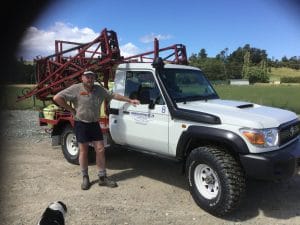A recent report commissioned by RCNZ from the Infometrics economic consultancy found that rural contracting is now a $1.5b industry, accounting for nearly 1 percent of New Zealand’s employment. Our sector has enjoyed sustained growth – 5.8% per annum since 2010 – with Bay of Plenty, Waikato and Canterbury our stand-out regions but our 500+ members are sprinkled from Northland to here in my home base of Southland. Of course, much of that growth is due to our relationship with and work for the farming community and we regard that as of primary importance; many of us contractors are farmers ourselves and most of us live in rural communities.Like you, our growth is tied to the health of the rural sector and the ability to secure good workers to help us run our businesses.
RCNZ has been cautiously welcoming of the proposals from Immigration Minister Iain Lees-Galloway announced just before Christmas to introduce a simpler, employer-led system for temporary work visas for skilled regional workers. We have been pleased to engage with Federated Farmers in putting a case for rural contracting to sit alongside the dairy farming, forestry and meat industries in the first sector-wide agreements. Our members help farmers get in enough winter feed, stay on top of weeds and a host of other tasks which allow your farms to remain productive. We need a steady reliable supply of skilled operators to drive our machinery from spring to autumn; getting approval to employ such people from overseas through the current hoops of WINZ and Immigration is an annual and frustrating nightmare.That said, we were again able to secure a reasonable supply of skilled overseas machinery operators, with 149 coming in spring through the existing Approval in Principle process, to work with 46 of our members.While we do all we can to employ New Zealanders, there simply aren’t enough with the skills or aptitude.
Reinforcing the importance of getting a better supply of overseas machinery operators is a recent approach to RCNZ by its Irish counterpart. FCI Ireland has told the Irish Government some of its members will be forced to close their doors – with dire effects on Irish farming – unless immigration rules change to allow foreign operators (including Kiwis) to work there. We can only hope the changes emerging here ensure we do not face any parallels as we already have enough shared challenges.
That has of course included MBovis which we collectively appear to have managed relatively well. Rural contractors appreciate the cooperation of farmers in providing water and appropriate washing areas.
We also appreciate your assistance as we remain vigilant as contractors on noxious weeds including Velvetleaf and Noogoora bur. We have to advise the authorities if we see any of these weeds, otherwise we can face huge fines as well as the risk of spreading the weeds to other farms. Chemical spraying remains a core part of our work for farmers and I have to say the . new Environmental Protection Agency, EPA, regulations are making things very complicated. I’d suggest farmers take note here, because while you do not currently have to meet such baffling, bureaucratic requirements, such extensions are always a possibility. RCNZ continues to run its annual Agrichemical roadshows around regional centres to provide a convenient way for our members – farmers welcome too – to stay up to date with the regulations and requirements. We also maintain our annual conference, this year in Nelson, which provides the glue which binds our members together, with three days of high-value speakers and workshops, as well as trade displays, to provide shared learnings for the year ahead.
RCNZ notes that this year Federated Farmers is bringing together the Primary Industries Summit which will put our sector front and centre of the national agenda. RCNZ will be in attendance to hear the speakers from the Prime Minister’s opening remarks and commend Federated Farmers for this initiative. We enjoy working with your organisation across a range of issues but I particularly applaud President Katie Milne, the Federated Farmers board, CEO Terry Copeland and his team, for developing this showcase Wellington event. It’s important to remind the rest of New Zealand how the primary sector creates and contributes most of the wealth that keeps our country moving.
Our Infometrics report confirms just how important rural contractors are to that movement, with our sector now employing nearly 23,000 people – about the same population as Masterton. That number has more than doubled in the last 20 years as farmers and others look for efficiencies.
We know that for such growth to be maintained, we have to continue to deliver value for the farming community and for New Zealand. RCNZ is up to leading that task and to working with Federated Farmers to achieve it.
David Kean, President RCNZ

